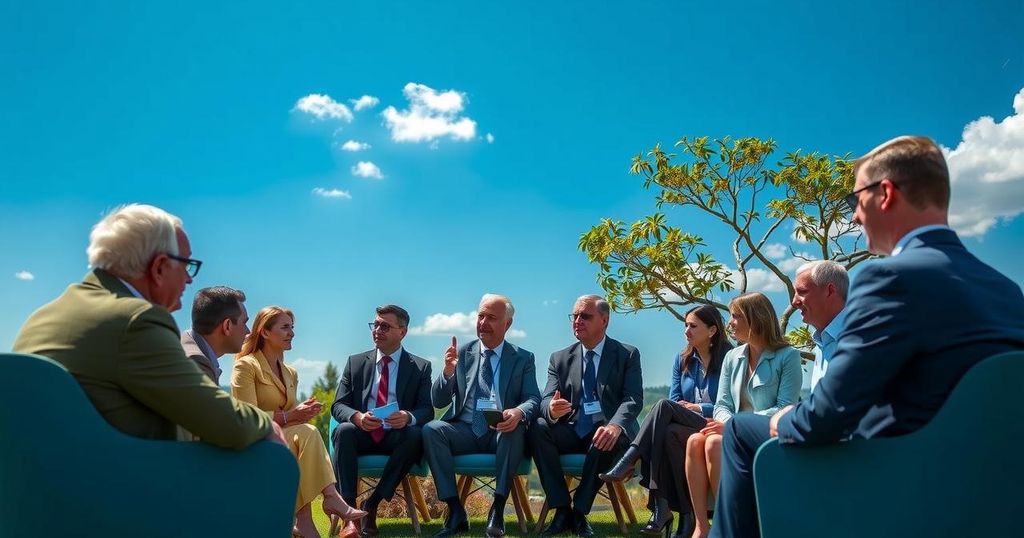Climate change
ANTÓNIO GUTERRES, ANTONIO GUTERRES, ASIA, AZERBAIJAN, BAKU, CLAUDIO ANGELO, CLIMATE CHANGE, CLIMATE JUSTICE, DONALD TRUMP, ENERGY, EU, EUROPE, GERMANY, GUARDIAN, NEW ZEALAND, OB, OCEANIA, PARIS AGREEMENT, SUSTAINABLE DEVELOPMENT GOALS, SWITZERLAND, THE GUARDIAN, UN
Leila Ramsay
0 Comments
Developed Nations Agree to Raise Climate Finance Offer to $300 Billion at COP29
At COP29, wealthy nations have agreed to raise climate finance for developing countries to $300 billion annually, after dissatisfaction with a previous $250 billion offer. This increase, however, is still regarded as insufficient by many poorer nations. The negotiations are complicated by the necessity for a transition away from fossil fuels and the political landscape influencing future commitments.
During the COP29 summit held in Baku, Azerbaijan, major developed nations have reached an agreement to increase climate finance assistance for developing countries to $300 billion per year. This decision follows dissatisfaction from poorer nations regarding an earlier proposal of $250 billion, which they deemed insufficient for addressing the climate crisis. The discussions extended overnight as key ministers from nations such as the EU, US, UK, and Australia engaged in negotiations to bridge differences concerning climate financing and the transition from fossil fuels.
Despite the increased funding, it should be noted that commentators argue this figure falls short of the amount necessary for developing nations to effectively address climate challenges and adapt to extreme weather events. The United Nations Secretary-General, António Guterres, was reportedly advocating for higher financial commitments among global leaders. Furthermore, it is indicated that $300 billion would likely elicit significant criticism if formally presented, as developing countries have articulated a need for a far greater sum, ideally around $1.3 trillion annually by 2035. Moreover, activists have called for even higher figures of $5 trillion to $7 trillion, rooted in the historical context of developed nations’ contributions to climate degradation.
The proposal aims to establish a new layered financing model, combining contributions from rich nations, innovative financial solutions, and private sector investments, all intended to meet the financial needs of developing countries. However, concerns have been raised that unresolved issues, particularly regarding commitments to phase out fossil fuel dependency, could complicate future negotiations and diminish the urgency of transitioning towards renewable energy.
The wealthier nations’ agreement to provide $300 billion represents a pivotal development in the ongoing discourse surrounding climate finance, but significant gaps remain in fulfilling the extensive needs articulated by developing nations. As the summit proceeds, stakeholders continue to navigate complex negotiations to build a sustainable framework for climate action on a global scale.
COP29 represents a critical dialogue aimed at addressing climate finance, particularly focused on how developed nations can assist developing countries facing severe climate impacts. The need for substantial funding is underscored by the historical responsibilities of developed nations in contributing to climate issues. The current economic climate, highlighted by the impending leadership shifts expected next year, adds urgency to negotiations, as developed countries seek to solidify commitments before potential political changes undermine agreed-upon support for climate finance.
In summary, while the tentative agreement to increase climate finance to $300 billion signifies progress at COP29, it remains inadequate according to many developing nations who demand higher financial support for climate adaptation and mitigation efforts. As negotiations unfold, the need for a robust financing structure and a firm commitment from rich nations to reduce dependency on fossil fuels will be pivotal. The resolution of these issues will shape the global response to the climate crisis in the years to come.
Original Source: www.theguardian.com




Post Comment